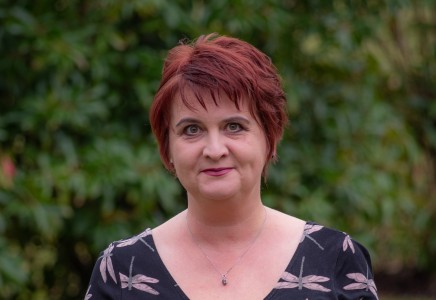Love of physics grows in tiny town with big impact
Tucked into the small town of Dubna, Russia, is the Joint Institute for Nuclear Research. Approximately 7,000 of the town’s 75,000 residents work as staff members or researchers at the institute—or about one in every ten residents living in the town. It was in this environment infused with a focus on nuclear physics that Jefferson Lab Staff Scientist Yulia Furletova was raised.
“I never worked at the institute and neither did my parents, but because it was this tiny city that I grew up in, I think the institute made some impact in my life, and that’s why I became a scientist and picked the field of nuclear and particle physics,” says Furletova. “I lived in Dubna until I was 17 years old.”
When it was time for her to go to university, Yulia moved to Moscow, where she earned her undergraduate and graduate degrees in engineering and high energy particle physics.
“After Moscow, I moved to Hamburg, Germany, for my Ph.D., and that was the beginning of my research adventure,” she recalls. “I lived in Germany for 15 years participating in experiments around the globe, including at DESY, CERN and KEK.”
“It’s really hard for families who have both of their parties working in the same field to find a position in the same city,” she says. “At that time, when my husband, who is also a physicist, got a job at Jefferson Lab and our family moved from Germany to Newport News, Virginia, I had a toddler and another child, so I decided to spend some time at home with them”
After spending only a few months as a stay-at-home mom, a position opened at Jefferson Lab, and she took advantage of the opportunity to return to nuclear physics research. She applied for this position and was accepted to work on development of the Electron-Ion Collider.
“Originally, when I was a child, I wanted to study astronomy,” says Furletova. “I was interested in outer space and the universe—and I was especially interested in black holes. Later, I realized that the sub-atomic world is also as large and unknown as outer space. What we can see at accelerator and particle facilities brings us very close to what we see in the Big Bang. At the lab, we’re trying to understand the nature of mass and the origin of different particles, what they’re made out of, and what binds them all together.”
Furletova is particularly interested in studying exotic particles, which are particles that appear to violate the laws of physics. Such an interest requires her to first have extensive knowledge of the laws of physics and experiment to better make sense of results that do not necessarily follow particular prescriptions.
“We have a Standard Model theory that describes the universal laws. But there are some questions that this theory can’t answer,” she says. “I’m an experimental physicist, and as an experimental physicist, you have to understand the whole process—the theory of how particles emerge, how these particles interact with the detector materials, how to process the output data from those detectors. You have to have understand the whole chain—not just knowledge of the tiny corners.”
Right now, Furletova is developing experiments with collaborators that will help to reveal the secrets of nature. The modeling and construction of the equipment and facilities needed for such experiments can take years and decades before experiments can be performed.
“Running a simulation to test our theories is not enough,” says Furletova. “We need experimental data. We need precise detectors, fast electronics and advanced data analysis methods. Right now, we are developing a new future electron-ion collider and detectors to help us to learn more. It is a really long, complex and difficult process and can involve thousands of scientists from hundreds of institutions around the world. It’s a global effort of accelerator scientists, theoreticians and experimentalists working together toward the same goal.”
Furletova is involved in the research and development program (R&D) for new advanced detectors. She is performing simulation of physics processes to optimize detector capabilities, and to enhance the physics program.
In addition, Furletova is helping to educate the young scientists who she knows will one day take over where she leaves off, just as she has followed in the scientific footsteps of nuclear physicists in the town in Dubna.
“We have several students in our group now, so we can work together and educate the next generation of experimentalists,” she says. “The first collision at the electron-ion collider will be in ten years, so we need to make sure that young scientists will be ready to analyze that new data.”
How does this next generation of physicists compare to Furletova’s contemporaries?
“The young generation is really smart,” she says. “And they are picking things up really quickly. They have a lot of good ideas and computer experience.”
Learn more about Yulia Furletova and her work
EIC Status – Detector and Simulations
SMU Physics Department Speaker Series – Yulia Furletova


